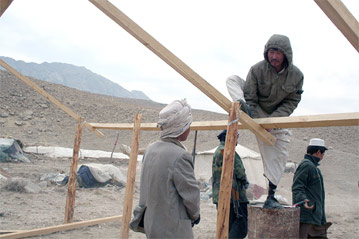Pakistan relief camp benefits from Korean cuisine
Pakistan relief camp benefits from Korean cuisine

BALAKOT, Pakistan, November 10 (UNHCR) - When the South Korean Emergency Relief Centre in Seoul heard about the devastating earthquake in Pakistan, its chairman gathered his resources and rushed over ... with cooking supplies.
"Just hearing about the magnitude of 7.6 on the Richter scale is enough to terrify someone; imagine those who were actually there when the tremors jolted the earth," says Kim Beam Kon, chairman of the relief centre. "We are here representing the people of South Korea to show our solidarity with the people of Pakistan in these trying times."
He and two other colleagues have come all the way from South Korea to provide cooked food for 2,838 people living in tents at Bassian camp in Balakot, northern Pakistan.
"The idea is to make a kitchen, prepare three meals a day and distribute it among the earthquake survivors in the camp, so that they don't have to worry about food as they have already been through a traumatizing time," Kim explains, adding that the kitchen serves Pakistani food and has a Korean bakery.
Bassian camp is one of 18 UNHCR-supported camps with a capacity for more than 3,200 families that survived the earthquake in Pakistan-administered Kashmir and North-West Frontier Province. The UN refugee agency is providing material and technical advice to help the Pakistan military and non-governmental organisations manage these camps.
"We have provided around 2,000 tents to the Pakistan army in three camps around Balakot town that have a population of 7,000 earthquake survivors," says Inam Ullah Khan, a UNHCR field officer in Balakot. "The army pitches the tents and allocates them to families arriving from mountain villages who at times have lost almost everything and had to walk for days to come here."
In addition to Khan, UNHCR has deployed a dozen national and international staff members in and around Balakot to oversee the relief activities. "It's encouraging to see services getting started in different sectors," adds Khan. "Now we have schools, clinics, drinking water, and soon a proper water and sanitation system will be in place in all the three camps."
Outreach workers from the Society for Sustainable Development - a local non-governmental organization (NGO) - are going from tent to tent to raise awareness of hygiene issues.
Taraque Foundation, a UNICEF partner and NGO based in Pakistan's south-western province of Balochistan, has started classes from grade one to eight in Ghari Habibullah camp near Bassian. The school in Bassian camp is ready to start classes soon.
"Starting proper classes in camps is a challenge, but we have been successful in establishing the school in the tents," says Adeel Qaiser, Taraque Foundation's relief coordinator. "There are over 200 boys and girls in Ghari Habibullah camp enrolled in the school and we hope that numbers will go up." He added that male and female teachers have been hired from within the community.

Back in Bassian camp, Kim is busy running the kitchen with people he hired from the camp. Despite hurting his arm when building the kitchen, he is soldiering on to make sure the camp residents can enjoy a variety of dishes.
"We love the people of Pakistan," he says, before disappearing into a UNHCR tent storing food supplies. What better way to show it than to share a hot meal on a cold autumn night. The relief centre plans to continue distributing food in the camp for six months.
By Babar Baloch in Bassian camp, northern Pakistan








